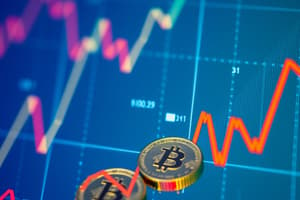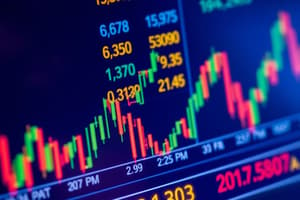Podcast
Questions and Answers
What are the main differences between over-the-counter and exchange-traded derivatives?
What are the main differences between over-the-counter and exchange-traded derivatives?
- Over-the-counter derivatives offer better liquidity than exchange-traded derivatives.
- Exchange-traded derivatives are regulated while over-the-counter derivatives are not. (correct)
- Over-the-counter derivatives are standardized while exchange-traded derivatives are customized.
- Exchange-traded derivatives are only available to institutional investors.
Which of the following is NOT a type of underlying asset for derivatives?
Which of the following is NOT a type of underlying asset for derivatives?
- Interest rates (correct)
- Equities
- Commodities
- Bonds
What type of option gives the holder the right to sell an asset?
What type of option gives the holder the right to sell an asset?
- Put option (correct)
- Warrant
- Forward contract
- Call option
Which statement best describes futures contracts?
Which statement best describes futures contracts?
What is the primary use of rights in relation to derivatives?
What is the primary use of rights in relation to derivatives?
How do warrants differ from options?
How do warrants differ from options?
What is an intrinsic value in the context of derivatives?
What is an intrinsic value in the context of derivatives?
Which of the following best describes the role of market participants in the derivatives market?
Which of the following best describes the role of market participants in the derivatives market?
What characterizes a futures contract in comparison to a forward contract?
What characterizes a futures contract in comparison to a forward contract?
Which of the following is NOT a common underlying asset for financial futures?
Which of the following is NOT a common underlying asset for financial futures?
What is the primary type of agreement formed when a forward is traded over the counter?
What is the primary type of agreement formed when a forward is traded over the counter?
What position does the party that agrees to buy the underlying asset in a futures contract hold?
What position does the party that agrees to buy the underlying asset in a futures contract hold?
Futures and forwards both require parties to fulfill their obligations, but what distinguishes this requirement?
Futures and forwards both require parties to fulfill their obligations, but what distinguishes this requirement?
What is a key distinguishing feature of OTC derivatives compared to exchange-traded derivatives?
What is a key distinguishing feature of OTC derivatives compared to exchange-traded derivatives?
What is the primary risk associated with OTC derivatives?
What is the primary risk associated with OTC derivatives?
How can one close an existing position in an exchange-traded derivative?
How can one close an existing position in an exchange-traded derivative?
What role do clearinghouses play in the context of exchange-traded derivatives?
What role do clearinghouses play in the context of exchange-traded derivatives?
Who primarily participates in the OTC derivatives market?
Who primarily participates in the OTC derivatives market?
Why is default risk not a significant concern for exchange-traded derivatives?
Why is default risk not a significant concern for exchange-traded derivatives?
What does it mean to offset a position in a derivative contract?
What does it mean to offset a position in a derivative contract?
Which statement best summarizes the nature of OTC derivatives?
Which statement best summarizes the nature of OTC derivatives?
What may restrict an individual investor from trading in the OTC derivatives market?
What may restrict an individual investor from trading in the OTC derivatives market?
What is a common characteristic of exchange-traded derivatives compared to OTC derivatives?
What is a common characteristic of exchange-traded derivatives compared to OTC derivatives?
What is the primary reason investors write put options?
What is the primary reason investors write put options?
What distinguishes a covered put write from naked put writing?
What distinguishes a covered put write from naked put writing?
In a cash-secured put write, what is advised for the cash set aside?
In a cash-secured put write, what is advised for the cash set aside?
What is the expectation of a naked put writer regarding stock prices?
What is the expectation of a naked put writer regarding stock prices?
What should naked put writers always ensure they have?
What should naked put writers always ensure they have?
Which of the following best defines covered put writing?
Which of the following best defines covered put writing?
Why is naked put writing a riskier strategy compared to covered put writing?
Why is naked put writing a riskier strategy compared to covered put writing?
Which of the following statements about put options is true?
Which of the following statements about put options is true?
What happens if the price of the underlying asset is favorable for a naked put writer?
What happens if the price of the underlying asset is favorable for a naked put writer?
Which scenario would benefit a cash-secured put writer the most?
Which scenario would benefit a cash-secured put writer the most?
What factors determine the price of a call option?
What factors determine the price of a call option?
If XYZ shares are trading at $45, what would be the approximate value of the XYZ December 55 calls?
If XYZ shares are trading at $45, what would be the approximate value of the XYZ December 55 calls?
What is the potential loss if the holder sells the call option when the XYZ stock price is at $45?
What is the potential loss if the holder sells the call option when the XYZ stock price is at $45?
What is the primary advantage of selling a call option prior to its expiration?
What is the primary advantage of selling a call option prior to its expiration?
What crucial aspect influences a call holder's decision to sell or hold the option?
What crucial aspect influences a call holder's decision to sell or hold the option?
What is intrinsic value of the XYZ December 55 calls if the stock price is at $60?
What is intrinsic value of the XYZ December 55 calls if the stock price is at $60?
What would be the total profit if XYZ December 55 calls are sold at $6.70?
What would be the total profit if XYZ December 55 calls are sold at $6.70?
What risk does a call holder face if the stock price does not rise?
What risk does a call holder face if the stock price does not rise?
Which of the following represents a common misconception about selling options before expiration?
Which of the following represents a common misconception about selling options before expiration?
What may happen to the call option's price if the stock price falls significantly?
What may happen to the call option's price if the stock price falls significantly?
Flashcards are hidden until you start studying
Study Notes
Overview of Derivatives
- Derivatives are financial instruments derived from underlying assets.
- Common categories of derivatives include options, forwards, and futures contracts.
- Investors use derivatives to leverage their positions, hedge risks, and speculate on price movements.
Key Differences in Derivative Types
- Over-the-Counter (OTC) derivatives are custom contracts between parties, often carrying default risk, as they cannot be traded on an exchange.
- Exchange-traded derivatives are standardized, allowing for easier termination through offsetting positions and have lower default risk due to the involvement of clearinghouses.
Underlying Assets
- Derivatives are based on a variety of underlying assets including:
- Stocks
- Bonds
- Currencies
- Commodities such as metals, oil, grains, and livestock
Users of Derivatives
- Market participants include institutional investors, hedge funds, and corporations using derivatives for risk management or speculative purposes.
Options Overview
- Two main types of options are call options (right to buy) and put options (right to sell).
- Call option buyers benefit if prices rise, while they risk losses if prices fall below the strike price.
- Time value influences option pricing; options retain additional value until expiration based on market volatility and time remaining.
Forwards vs. Futures
- Forwards are private agreements obligating buyer and seller to trade an asset at a future date for a price set today.
- Futures are standardized forwards traded on exchanges, facilitating easier transactions and reduced default risk.
- Financial futures involve assets like stocks and currencies, while commodity futures involve physical assets like oil or grains.
Rights and Warrants
- Rights allow investors to purchase shares at predetermined prices, benefiting from price rises.
- Warrants are longer-term options, often granted as part of a bond or preferred stock, allowing for price appreciation over time.
Writing Options
- Investors write put options to earn premium income, classified as covered (includes stock ownership) or naked (no stock position).
- Cash-secured put writing involves setting aside cash equivalent to the strike price to purchase underlying shares if assigned.
Default Risk
- A significant concern for OTC derivatives, default risk affects participants' willingness to engage in contracts, limiting them mainly to large institutions.
- Exchange-traded derivatives mitigate risk through clearinghouses, which guarantee the financial obligations involved in trades.
Studying That Suits You
Use AI to generate personalized quizzes and flashcards to suit your learning preferences.




